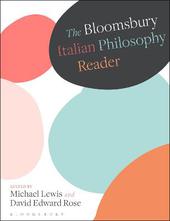
|
The Bloomsbury Italian Philosophy Reader
Hardback
Main Details
Description
Italian philosophy constitutes one of the most vibrant and fruitful areas in contemporary thought, bringing extraordinary novelty to some of the oldest tropes, from human nature to the relation between political power and life, the thinking of actuality and potential, and the nature of work and labour. This reader includes texts by the most renowned thinkers, from Dante and Machiavelli to Giorgio Agamben, Antonio Negri, and Roberto Esposito, all of which are introduced by an expert on the particular thinker, and situated within the context of their work as a whole. The Bloomsbury Italian Philosophy Reader provides a unique resource for students and scholars alike, covering the history of Italian thought to the present day.
Author Biography
Michael Lewis Teaching Fellow in Philosophy, University of Newcastle upon Tyne, UK. He is author of Heidegger and the Place of Ethics, Heidegger Beyond Deconstruction, Derrida and Lacan: Another Writing, and The Beautiful Animal: Sincerity, Charm, and the Fossilised Dialectic. He is a founding editor of the Journal of Italian Philosophy. David Rose is Senior Lecturer in Philosophy, University of Newcastle upon Tyne, UK.
ReviewsThis welcome volume cohesively brings together some of the major thinkers of the history of Italian philosophy, from the Middle Ages to the Renaissance to the contemporary period. Readings are introduced by brief informative essays written by specialists that act as useful philosophical mind-maps for readers. The excerpts from primary writings capture central positions and ideas that have come to shape and influence readers and thinkers from around the world. The book helps provide an important survey of the rich and varied schools that have come to form Italian philosophy. * Antonio Calcagno, Professor and Chair of Philosophy, King's University College at Western University, Canada * This volume brings welcome attention to an important tradition in Continental Philosophy which has too often remained in the shadows of its French and German neighbours. Italian philosophy appears here as political, practical, and transformative; intimately close to the concerns of life. * Ashley Woodward, Senior Lecturer in Philosophy, University of Dundee, Scotland *
|